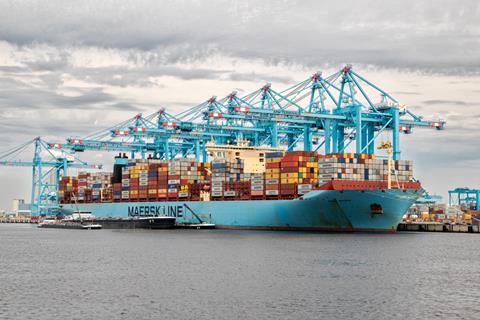Company says the agreement with LONGi further confirms the ability of bio-methanol to achieve significant greenhouse gas emission reductions this decade
AP Moller-Maersk has entered into a long-term bio-methanol offtake agreement with LONGi Green Energy Technology.

According to the logistics giant, the agreement will contribute to lowering GHG emissions from its growing fleet of dual-fuel methanol container vessels.
”Bio- and e-methanol continues to be the most promising alternative shipping fuels to scale up in this decade, and the agreement with LONGi serves as a testament to this,” said Rabab Raafat Boulos, chief operating officer at Maersk.
”Global shipping’s main net-zero challenge is the price gap between fossil fuels and the alternatives with lower greenhouse gas emissions.
”We continue to strongly urge the International Maritime Organization’s member states to level the playing field by adopting a global green fuel standard and an ambitious pricing mechanism which the industry urgently needs,” Boulos outlined.
Maersk said that, with the addition of the LONGi volumes, it was making progress in securing enough methanol for its owned dual-fuel methanol fleet, of which seven vessels are already in operation.
The group’s combined methanol offtake agreements now meet more than 50 per cent of the dual-fuel methanol fleet demand in 2027.
The agreement, it said, had evolved out of Maersk’s growing global alternative fuels portfolio, of which several other methanol projects were currently in advanced stages of maturity.
”While we believe that the future of global logistics will see several pathways to net-zero, this agreement underscores the continued momentum for methanol projects that are pursued by ambitious developers across markets,” said Emma Mazhari, head of energy markets at Maersk.
”China continues to play a pioneering role, and it is encouraging to also see strong market developments in other geographies as well. One example is the US where we are engaging closely with several promising projects.”
The agreement with LONGi delivers bio-methanol produced at a facility in Xu Chang, Central China.
The bio-methanol is produced from residues (straw and fruit tree cuttings), and will meet Maersk’s methanol sustainability requirements including at least 65 per cent reductions in GHG emissions on a lifecycle basis compared to fossil fuels.
Q3 results
Meanwhile, the company has released its results for the third quarter of the year, reporting strong results across all business segments.
Maersk said results were ”significantly above” those of the previous year, primarily driven by the ocean segment, while both logistics and services and terminals also contributed through improved earnings.
Consolidated revenue rose to US$15.76bn from US$12.13bn in the same period of 2023, while EBITDA jumped from US$1.88bn to US$4.8bn.
”This quarter, we once again supported our customers through times of high volatility and low visibility,” stated CEO Vincent Clerc.
”We reaffirmed our commitment to profitable growth and operational progress, driving results across all business areas through continued rigorous focus on cost discipline, productivity gains, and efficient asset utilisation.
”In logistics and services, our focused effort led to steady margin improvements and growth through new customer wins,” he continued. ”In terminals, we drove additional improvements, building on already high performance.
“Our ocean team responded to the recurring network disruptions with high agility by leveraging our hub terminals and investing in capacity and equipment to mitigate the supply chain impact on our customers while optimising unit costs.”
Maersk upgraded its guidance for 2024 on 21 October, and is now expecting full-year underlying EBIT of US$5.2bn-US$5.7bn.



